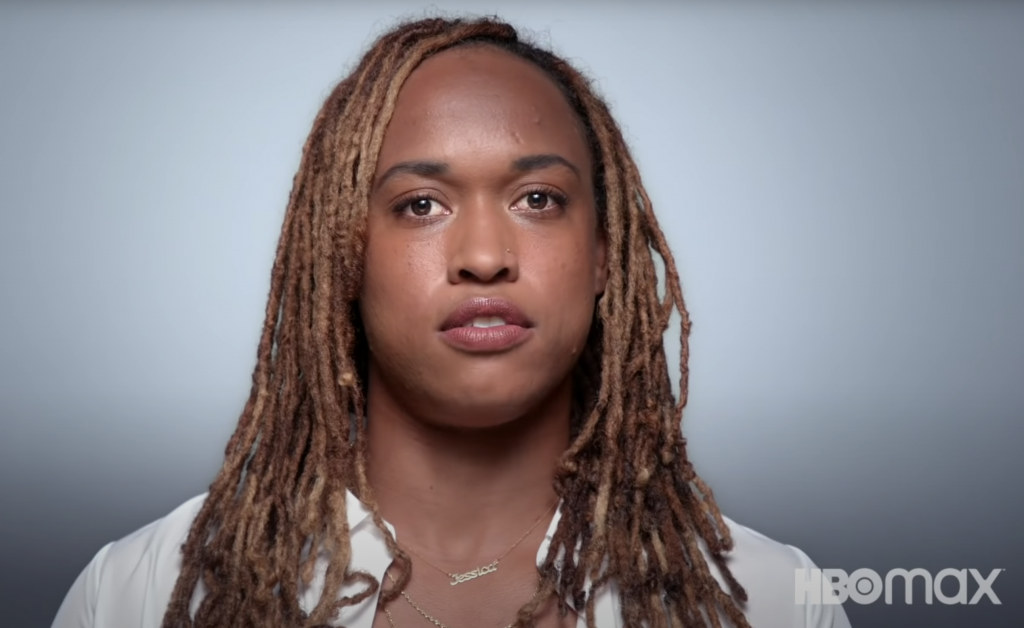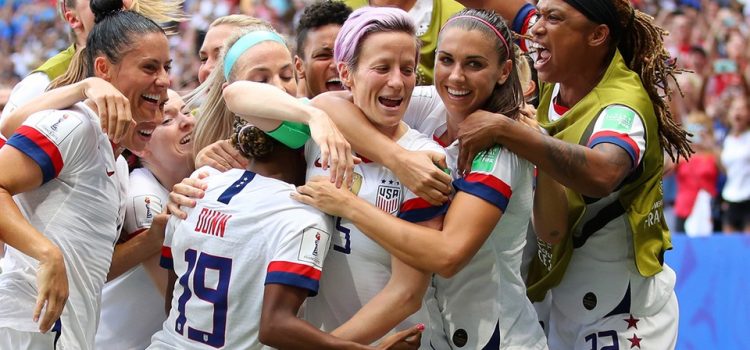By Lynn Venhaus
Three months before the 2019 FIFA Women’s World Cup, on March 8 (International Women’s Day), all 28 players of the U.S. National Women’s Soccer Team filed a class-action gender discrimination lawsuit against the U.S. Soccer Federation.
“LFG” is about the legal battle and features interviews with players Megan Rapinoe, Jessica McDonald, Becky Sauerbrunn, Kelley O’Hara, Sam Mewis and Christen Press, among others, and their attorneys and representatives.
In this hard-hitting documentary, the U.S. National Women’s Soccer Team gives their side of the inflammatory story on their legal fight for equal pay that is considered one of the most important women’s rights issues for athletes since Title IX.
Mixed in with their accomplishments on the playing field – four World Cups (Men 0) and four Olympic medals — are what happens regarding their case from March 2019 to March 2020, with legal updates through March 2021.
Directed by the Oscar-winning husband-and-wife team of Andrea Nix Fine, who also wrote the screenplay, and Sean Fine, who was the cinematographer too, the movie showcases the players’ boundless energy, unflinching courage and their tenacity about fighting for social change.
This inside look at the pressures of being world-class athletes, the physical and mental demands of their sport and their commitment to each other is compelling.
Their arguments are passionately presented – and they respond to their critics through optimum performance.
Whatever their secret sauce is that makes them extraordinary is exemplified through their character, and their strength is remarkable – as is their deep-rooted loyalty to each other. We have seen how resourceful they are as players and now we see how much integrity they have as people.
Considered game-changers, these women compete with both their heads and hearts. On camera, their belief in themselves and each other comes through – and with candid clarity. They are frank, articulate and not afraid to express how they really feel.
Of course, this documentary is pointedly in the women’s favor. The directors, who won an Academy Award for Best Documentary Short Subject in 2012 for “Innocente,” take an in-your-face approach to the story. They start the film off by saying no one in the U.S. Soccer Federation agreed to an on-air interview.
Using tight close-ups of the players as fervent talking heads, this allows viewers to connect with the players on a very personal level.
They use high-energy music by a female band called Barn Owl, which feels contemporary and urgent.
Through their editing, they show the players’ impact on future generations, and the final montage of devoted little girls honing their ball skills solidifies the impact they are striving for – it is these children that will benefit from the changes they seek.
“It’s so much bigger than this group of people,” said Molly Levinson, the communications director for the women’s team. “We have a lot to lose if we don’t succeed.”
As in all documentaries, the use of archival footage and many newspaper clippings and media cut-outs helps fortify their position.
Lead attorney Jeffrey Kessler and co-counsel Cardella Spangler make convincing arguments. They stress the disparity between the men’s and women’s players and set the record straight on facts and figures. The women must win many more games and tournaments to come close to earning what the guys do, yet still receive less pay per match.
The players acknowledge naivety regarding the U.S. Soccer Federation’s attempts to do right.
When President Carlos Cordeiros said: “We hear you, we believe in you,” they thought agreeing to fair and equitable pay would follow. After all, fans got behind the team. But the executives did not take responsibility and hired lobbyists to fight the team.
Then came the unfortunate statement that biologically, women were inferior to men.
That touched off a firestorm that they had to walk balk. The lack of respect irked the players, who dug in. They wonder have women been brainwashed to be grateful for the basics?
The gender arguments will get under any woman’s skin, no matter what occupation. It’s inevitable.
Because of the pandemic, there have been delays, but the saga continues. A judge rejected the unequal pay claims part of the lawsuit, now in appeal. The movie fills everyone in as much as possible on what has transpired.
Their fight is not over, and their rallying cry continues. Most of the team will play in the 2021 Tokyo Summer Olympics. LFG! And about that title — it’s for “Let’s (Expletive Deleted) Go!”

The documentary premiered at the recent Tribeca Film Festival and is now available on HBO Max. However, it is co-produced by CNN Films, so expect it to land there at some point.
“LFG” is a documentary co-directed by Andrea Nix Fine and Sean Fine. It’s rated TV-MA, for language, and runs 1 hour, 44 minutes. Lynn’s Grade: B

Lynn (Zipfel) Venhaus has had a continuous byline in St. Louis metro region publications since 1978. She writes features and news for Belleville News-Democrat and contributes to St. Louis magazine and other publications.
She is a Rotten Tomatoes-approved film critic, currently reviews films for Webster-Kirkwood Times and KTRS Radio, covers entertainment for PopLifeSTL.com and co-hosts podcast PopLifeSTL.com…Presents.
She is a member of Critics Choice Association, where she serves on the women’s and marketing committees; Alliance of Women Film Journalists; and on the board of the St. Louis Film Critics Association. She is a founding and board member of the St. Louis Theater Circle.
She is retired from teaching journalism/media as an adjunct college instructor.

